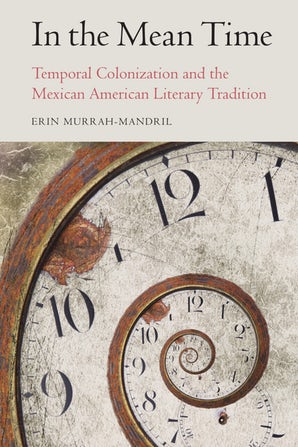
E, Murrah-Mandril, In the Mean Time. Temporal Colonization and the Mexican American Literary Tradition
Erin Murrah-Mandril
In the Mean Time. Temporal Colonization and the Mexican American Literary Tradition
University of Nebraska Press
186 p.
ISBN : 978-1-4962-1182-8
50,00 $
PRÉSENTATION
The 1848 Treaty of Guadalupe Hidalgo, which transferred more than a third of Mexico’s territory to the United States, deferred full U.S. citizenship for Mexican Americans but promised, “in the mean time,” to protect their property and liberty. Erin Murrah-Mandril demonstrates that the U.S. government deployed a colonization of time in the Southwest to insure political and economic underdevelopment in the region and to justify excluding Mexican Americans from narratives of U.S. progress. In In the Mean Time, Murrah-Mandril contends that Mexican American authors challenged modern conceptions of empty, homogenous, linear, and progressive time to contest U.S. colonization.
Taking a cue from Latina/o and borderlands spatial theories, Murrah-Mandril argues that time, like space, is a socially constructed, ideologically charged medium of power in the Southwest. In the Mean Time draws on literature, autobiography, political documents, and historical narratives composed between 1870 and 1940 to examine the way U.S. colonization altered time in the borderlands.
Rather than reinforce the colonial time structure, early Mexican American authors exploited the internal contradictions of Manifest Destiny and U.S. progress to resist domination and situate themselves within the shifting political, economic, and historical present. Read as decolonial narratives, the Mexican American cultural productions examined in this book also offer a new way of understanding Latina/o literary history.
SOMMAIRE
Preface
Introduction: The Mean Time of U.S. Modernity
1. Temporal Colonization: Getting Railroaded in The Squatter and the Don
2. Progress in the Land of Poco Tiempo: Miguel Antonio Otero’s Political Vision
3. Specters of Recovery: Temporal Economies of Debt and Inheritance in Adina De Zavala’s History and Legends of the Alamo
4. Modernity and Historical Desire: Differential Time Consciousness in Caballero
Afterword: The Discontinuous Inheritance of Mexican American Literature
Notes
References
Index
AUTRICE
Erin Murrah-Mandril is an assistant professor of English and a core faculty member for the Center for Mexican American Studies at the University of Texas at Arlington.